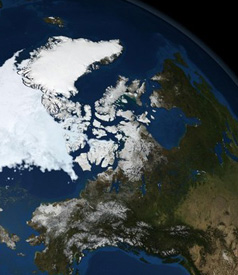
|  |  |  Editorials | Environmental | September 2009 Editorials | Environmental | September 2009  
Study Finds More Evidence Rapid Arctic Warming Isn't Natural
 Renee Schoof - McClatchy Newspapers Renee Schoof - McClatchy Newspapers
go to original
September 06, 2009


| | NASA satellite photo of Arctic sea ice in September 2008. (Reuters) |  |
Washington - The Arctic was cooling for 1,900 years because of a natural change in Earth's orbit until greenhouse gas accumulation from the use of fossil fuels reversed the trend in recent decades, according to a study published Friday in Science magazine.

Scientists reconstructed the temperature record of the past 2,000 years using evidence from tree rings, ice cores and lake sediment, and found a steady cooling trend in Arctic summer temperatures of about 0.5 degrees Celsius - 0.9 degrees Fahrenheit - during the first 1,900 years. The cooling was caused by a slow natural cycle in Earth orbit that continues in this century.

"The summer cooling would likely be continuing today were it not for the increase of greenhouse gases from fossil fuel burning," said David Schneider, a scientist at the National Center for Atmospheric Research and one of the authors of the study. "The results are important in showing that the dramatic changes happening today - and particularly the rapidity of the changes - are not natural."

Darrell Kaufman, a professor of geology and environmental science at Northern Arizona State University and the lead author of the study, put it this way: "The warmth in the Arctic during the second half of the 20th century, combined with the last decade, is striking against the backdrop of the previous 1,900 years. ... The second half of the 20th century was warmer in the Arctic than any other half-century of the last 2,000 years."

Further, 1999 to 2008 was the warmest decade in the Arctic of any in that period, the report in Science said. Temperatures were about 1.4 degrees Celsius - 2.5 degrees Fahrenheit - higher than would have been expected if the natural cooling trend had continued.

Scientists already knew that the Arctic is warming two to three times faster than the rest of the planet is.

The new study gives a better understanding of how the climate system behaves over longer time scales, Schneider said. Previous studies with that level of detail went back only 400 years, and most of the record from thermometers in the Arctic dates back only about 50 years.

"We have a lot more data than we had before, and better climate models for understanding that data," Schneider said.

One of the most important findings from the study was that its findings matched the output of the National Center for Atmospheric Research's climate-system computer model, Kaufman said.

"The climate model used in this study is among those that have been used to predict future climate. The match between our proxy temperature record and the climate-model output adds to our confidence in the model's ability to accurately simulate temperature responses to factors that influence climate change," he said. "This is especially important for the Arctic, where the influence of global warming is amplified." |

 |
|  |



